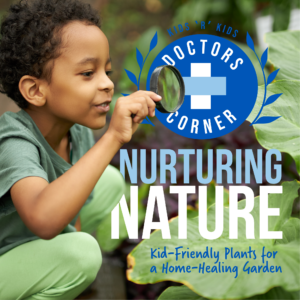
Plants have been revered for their healing properties for centuries, and for good reason! In fact, many of our modern medicines come from these humble, homegrown beginnings. Parents can engage kids in a hands-on approach to wellness by planting a garden filled with safe, supportive sprouts. While these plants are not a substitute for professional medical care, they may lend a helping hand against some common ailments.
Aloe Vera
Aloe vera is a low-maintenance succulent known for its soothing properties. The gel found within the plant’s leaves contains essential nutrients that aid in healing and reducing inflammation and relieving minor burns, cuts, and skin irritations. Aloes love bright sun and don’t need much water, making them a great drought-tolerant choice.
Mint
Mint, with its refreshing scent and taste, is an easy-to-grow herb that children can easily tend to. Mint can be used for flavoring and for teas, which can settle upset tummies and soothe headaches. Make sure to plant it in a container – mint will spread quickly and can take over a whole plot!
Chamomile
Chamomile is a gentle herb with darling, dainty flowers that bring a sweetness to any healing garden. Use dried blooms to brew a mild tea that can promote relaxation and calm and soothe gassy, irritated stomachs, or reach for a topical chamomile balm to soothe aches and pains. If your family has ragweed sensitivities, skip this particular plant; they’re close cousins and can trigger the same reactions.
Fennel
With its licorice-like flavor, fennel is another herb known for its digestive benefits, and the entire plant from fronds to bulb is edible. If the taste of a tea is too strong for tiny taste buds, the fronds blend beautifully into pesto, and shaved fennel bulb makes a yummy salad addition.
Calendula
Calendula is a vibrant, flowering plant with anti-inflammatory and antioxidant properties. Its blossoms are used in soothing topical ointments and salves for irritated or inflamed skin. Some eczema-sufferers find relief from calendula products, especially when paired with colloidal oatmeal.
Before adding any plants to your family’s diet or first aid regimen, always speak with a doctor. Be aware of possible allergies and medication interactions, and exercise caution in the garden and kitchen. You won’t replace the first aid kit, but growing helpful healers can be a fun and functional way to support your family’s health.